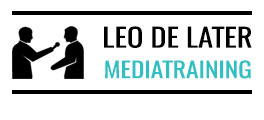Authenticity
The concept of authenticity is often mentioned in media training. Participants talk about it when they mean that they want to be themselves and not feel as though they have to act, because that doesn’t come across well. Authenticity is certainly important. Especially when it comes to radio and TV, where you’ll be mercilessly exposed if you try to play a role. That said, there’s a misconception lurking.
What is authenticity?
Authenticity comes from the Latin authenticus, which means something like ‘first hand’. What is meant is: real, genuine, consistent with the original. We use it in the sense of ‘real’. Someone who is authentic is real, original. He shows who he really is and, as a result, is believable and reliable. So authenticity in a media appearance is important. Who doesn’t want to come across as credible? But what if the person is authentic but impossible to follow because his story is too complicated or unclear?
Authenticity first?
Recently, we gave a media training to the municipal council of a middle-sized local authority. One of the councillors, who has a complicated issue in his portfolio, was unable to summarize the matter in a clear and comprehensible story. Confronted with our feedback, he countered that, for him, authenticity was paramount. He didn’t want to have to think about streamlining his message for the media. If he did that, he would lose himself, he argued. So he was determined to tell the issue in his own words. The problem was that this didn’t benefit the story. We had to listen to abstractions, bureaucratic jargon and a jumble of information that was impossible to decipher.
Sometimes you have to finesse
Certainly politicians, ultimately elected representatives, have an interest in ensuring that their message comes across clearly. If people can’t follow your story, then basically you’re not effective. In other words: what is the use of being authentic if by being so you lose your audience? Authenticity is inseparable from the message that you want to communicate. If that isn’t clear, then authenticity is meaningless. So sometimes it’s necessary to finesse a story.
Ego aside
In The Hague, politicians and their advisors do this continually and they also enjoy it. They reach for a nice one-liner or use an appealing example to make their point. In this sense, media appearances are just work. Working the message. Sometimes you really need to set aside your ego in order to achieve your goal. The message comes first. If you can do this by being yourself, it’s a bonus. Media training is certainly not meant to push authenticity aside. But it is paramount that, first of all, your story is in order. Don’t make authenticity sacred if it is at the expense of working on a good media message.

